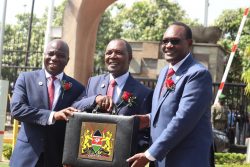
The government seeks to accelerate the Bottom-Up Economic Transformation Agenda (BETA) through the Sh3.9 trillion Budget unveiled last Thursday, allocating funds for various projects and initiatives aimed at benefiting mwananchi under the five BETA pillars.
The Budget focuses on enhancing agricultural transformation, supporting Micro, Small and Medium Enterprises (MSMEs),boosting affordable housing, achieving universal healthcare, and growing the digital superhighway and creative economy for job creation.
In agriculture, the government aims to transform the sector and promote inclusive growth through a value chain approach. “This aims at providing adequate and affordable working capital to all farmers through cooperative societies (aggregators),” said Prof Njuguna Ndung’u, the Cabinet Secretary for National Treasury and Economic Planning.
The National Treasury allocated Sh54.6 billion for agriculture, including Sh10 billion for fertiliser subsidies, Sh6.1 billion for the National Agricultural Value Chain Development Project, Sh2.5 billion for youth and women programmes, Sh747 million for small-scale irrigation, and Sh642.5 million for crop diversification. These allocations aim to stimulate job creation, especially for youth, through enhanced agricultural production supported by small-scale irrigation and subsidised fertiliser.
Agriculture contributes up to 30 per cent of the country’s Gross Domestic Product and employs 40 per cent of the population. Over 6.5 million farmers received 12.5 million bags of subsidised fertiliser this planting season, boosting food production.
MSMEs received a boost with Sh5 billion allocated to the Hustler Fund to scale up access to credit for business growth. Prof Ndung’u said the money would offer affordable credit to Kenyans at the bottom of the pyramid, with an additional Sh200 million for the Youth Fund and Sh1.9 billion for the Rural Kenya Financial Inclusion Facility, targeting youths in rural areas. Since its inception in 2022, the Hustler Fund has provided over Sh45 billion in loans to 20 million Kenyans.
The government’s commitment to addressing the housing challenge and creating quality jobs for youth in the construction sector and building products production is evident in the Budget. Sh92.1 billion was allocated for Housing, Urban Development, and Public Works, aiming to deliver 200,000 houses per year and enable low-cost housing mortgages. Affordable housing projects have created 120,000 jobs for youth, according to President William Ruto.
The health sector received Sh127 billion to promote access to quality and affordable healthcare through the Universal Health Coverage Programme. The funds will support initiatives to reduce HIV/AIDS, malaria, and tuberculosis cases, enhance vaccine and immunisation programmes, manage cancer, and build and equip hospitals. The Ministry of Health will begin mass registration for the Social Health Insurance Fund (SHIF) on 1 July 2024 to improve healthcare access.

The government also seeks to ramp up investment in the ICT sector, allocating Sh16.3 billion for the Last Mile County Connectivity Network, building the digital superhighway, and establishing the Kenya Advanced Institute of Science and Technology at Konza Technopolis.
In the past two years, the government has boosted job creation in the sector by providing free WiFi spots, training over 350,000 youths in digital skills to access digital opportunities, and setting up more than 85 digital hubs
across the country.
